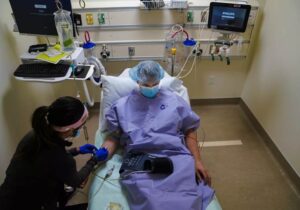Just over a year ago my husband, Tom, and I arrived in the Pacific Northwest after many years of living in various places throughout the Midwest. We were in search of better weather – relief from icy cold winters and hot humid summers.
Besides weather, two other major considerations for relocating – to be out west and in a college town. One significant factor we didn’t consider — healthcare.
I don’t believe we were completely negligent. We knew there was a hospital given we had visited with our son on Thanksgiving Day just the year prior to our move. The hospital was clean, the ER care efficient, and billing wasn’t a hassle.
Additionally, we asked a friend who had grown up in this particular place about the quality of healthcare; there weren’t any negatives or red flags. Our insurance provider even provided us with a list of recommended physicians that accepted our insurance plan.
Active Participants in Healthcare
I never suspected that finding a physician would become the major stumbling block to establishing healthcare. The vast majority of physicians in this city are aligned with either one of two physician groups (one of the groups is affiliated with the hospital.)
Tom and I take care of our health by exercising regularly and eating a well-balanced diet. Despite our best efforts though we both have chronic medical conditions. For Tom it’s managing high cholesterol and for me it’s Multiple Sclerosis. Therefore, we expect our healthcare providers to have the expertise to manage such medical conditions.
As senior citizens, we also desire healthcare providers with both the knowledge and the experience on medical changes that occur with aging – bone health, metabolism, and cardiovascular issues.
We consider the relationship between a provider and patient a partnership. In our experience, the practice of healthcare improves when there is good communication and trust, factors dependent on the continuity of care. Such care begins by establishing a health baseline; such a baseline provides context for whether or not any changes should be a concern.
Difficulties With Finding a Physician
Tom was the first to begin the physician search and ran into obstacles immediately. The physician group not directly related to the hospital would not accept new patients with Medicare. And the hospital affiliated physician group wouldn’t let Tom choose a physician from the list of physicians recommended by our insurance plan.
In fact, the physician group selected his provider, a D.O. (Doctor of Osteopathic Medicine). My husband did not have a choice. There was no opportunity for him to select a physician based on patient recommendations, physician specialty, experience, or compatibility. After one year, Tom’s physician moved into a new role. So much for continuity and having a baseline. Tom now begins again, this time with a newly assigned Nurse Practitioner as his primary care provider.
More Difficulties with Finding a Physician
My experience with finding a physician presented slightly different challenges. I was determined to select a primary care physician based on my criteria – Internal Medicine and female – from the list provided by our insurance company.
After a few phone calls, it became clear I could not make an appointment directly with any of the physicians in the group affiliated with the hospital. It was mandatory to use their Find a Doctor phone system. And apparently the only primary care providers available to me as a new patient were either D.O.’s or Nurse Practitioners.
I finally found a physician from the physician group not affiliated with the hospital. The receptionist on the phone though wasn’t sure whether this physician was accepting new patients. I had to wait several days for a return phone call. Fortunately, this physician was accepting new patients, however, the next available appointment was not for another NINE months. I said I would wait.
My first appointment was informational only – no annual exam. When the appointment finally happened, I discovered the reason for the long wait — she only works part-time. I did mention our difficulties with finding a provider and she informed me there is a shortage of primary care physicians. Our small city not only has challenges with getting primary care physicians to locate here but struggles to keep them once they arrive.
A Primary Care Physician Shortage and the Impact on Quality of Care
The national news has certainly covered the lack of primary care physicians and how this issue is only going to deepen given fewer medical students choosing primary care as a profession. But I would have thought a city in the Pacific Northwest with a high quality of living, that such a place would be desirable for new physicians to locate, and particularly new physicians with families.
The whole process of finding a primary care doctor has been a bit of a culture shock for both of us. I’ve had to wait for physician appointments before but I’ve never had ACCESS to a physician controlled by a physician group. And as my husband said to me recently, he has no CONTROL over his own healthcare. He is beholden to whatever may be the strengths or weaknesses of the provider selected for him.
This does not feel like patient-centered healthcare. And as senior citizens, we feel particularly vulnerable. This is a time in our lives when continuity seems vitally important, when relationships with providers that we know and trust is preferred, and good communication is essential.
What are Your Experiences?
So, I am curious about your relationships with medical care professionals. More specifically, have you experienced any issues due to the national shortage of primary care physicians?



